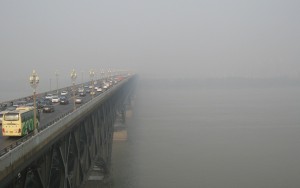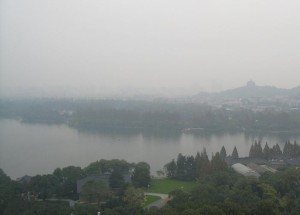On January 12, 2013, Chinese authorities urged Beijing residents to stay indoors due to hazardous levels of air pollution. A CBC News article reported experts claimed the levels of the fine particulate matter (PM2.5 ) in Beijing were the highest on record, since the city began publishing air quality updates in 2012. Many Beijing residents refused to venture outdoors, following recommendations from the Beijing Municipal Environmental Monitoring Centre. PM2.5 has been proven to penetrate deep into the lungs and can affect human respiratory and cardiovascular systems.
I travelled through eastern China last year and visited over half a dozen cities. It was my first time in the country and I was impressed with what I saw: a unique culture, beautiful landscape surrounding the Great Wall, and magnificent architecture that shows the vast history of the nation. In the big cities, particularly in Shanghai, I saw a booming industrial centre. However, there was a negative aspect to the industrialism that was impossible to ignore. In Beijing and Shanghai I saw buildings disappear into thick smog that overwhelmed the environment. The air pollution also followed me to other cities; it was an ever-present reminder that industrialization comes with a price.
I spent the last few days of my travels in Shanghai and during that time I became quite ill. My voice was hoarse, I developed a fever, an unusual dry cough and an uncomfortably dry throat. I had coughing fits throughout the day and night that made it almost impossible for me to sleep. It felt unlike any cold or flu I had ever experienced. When I returned to Canada, I was diagnosed with a severe reaction to the air pollution. I took antibiotics for a couple of weeks and it took even longer for me to fully recover.
It’s no secret that pollution causes problems. Environment Canada says that there is no safe level for PM2.5 that does not pose risks to human health. Further, negative health effects increase as the concentrations of pollutants in the air increase.
It’s also no secret that China has to face the problems that come with the high levels of pollution in the country. An article in the International Business Times says the poor air quality discourages many tourists from travelling to China’s big cities. Leading up to the Beijing 2008 Olympics, international criticism about the air pollution pressured China’s capital to improve its air quality. Many factories surrounding Beijing closed down before the Olympics and did not reopen until after the games ended.
China’s air pollution problems are usually attributed to the country’s rapid pace of industrialization. And this pace of industrialization in China is encouraged by other countries. In North America, much of what we buy is made in China. American writer Sara Bongiorni wrote a book in 2007 about the West’s dependence on Chinese exports, titled A Year Without “Made in China.“ According to Bongiorni, her year-long experiment to avoid buying Chinese goods in the United States resulted in a year without birthday candles, video games, and holiday decorations, among other things. She writes that when friends and strangers ask her if life without China is possible, she replies, “not a chance.”
If the West didn’t buy Chinese exports, fewer factories would exist throughout China, along with less air pollution. It’s easy to criticize the country for its compromised air quality, but the high level of pollution from factories is a phenomenon reinforced by the West’s willingness to buy cheap goods. China supplies a demand for inexpensive products in the West and benefits from economic gain, but not without consequence. The ever-present murky skyline throughout the country reminds locals and visitors alike of industrialization’s darker side.


Another great blog post on a crucial issue, Aneta. The effects of pollution (in its many forms) is important to consider and work towards reducing the impacts. Besides the obvious and direct dangers to human health (respiratory, allergies, cardiovascular), animal well-being (survival, migration, reproduction, etc.) and the delicate state of the Earth’s biodiversity, we need to realize that we all share this planet. Therefore, the harmful effects of pollution transcend across national boundaries and take its toll on everyone in the world, regardless of where you live. The air that we breath is global and it’s all of our responsibilities and highest moral duty to ensure that we protect it. Otherwise, what can we possibly work towards as a society?
This is a Catch-22 scenario because, to a large extent, humans are the ones that perpetuate pollution as a result of industrialization. We generate dirty air by using cars, powering our homes and offices, airlines, factories and consumeristic lifestyles. If we didn’t do these things, we wouldn’t be able to live the lifestyles that we have grown accustomed to. On the other hand, we are also desperately trying (at least some of us) to combat and reduce the effects of pollution in many ways. The irony is that we are trying to stop the very thing that we have perpetuated and increased.
I think that you have touched upon all of these points within your post and even gone beyond that to include your personal experiences in China as well as research elsewhere. The topic of air and pollution is so crucial for us to comprehend that we sometimes disregard or refuse to look at the reality and effects of our actions (perhaps out of a lack of understanding or fear of what lies ahead if we do not respond appropriately). This is not the correct mindset. We need to educate, establish responsibility and enforce action (one way or another) to protect the environment and, by extension, ourselves and everything that we value.
It’s true that by living our contemporary and object-driven lifestyles, we have become severely detached from the balance with nature; a balance that is of the highest priority any way you look at it.
Thanks for an informative read!
Serge Lokshin